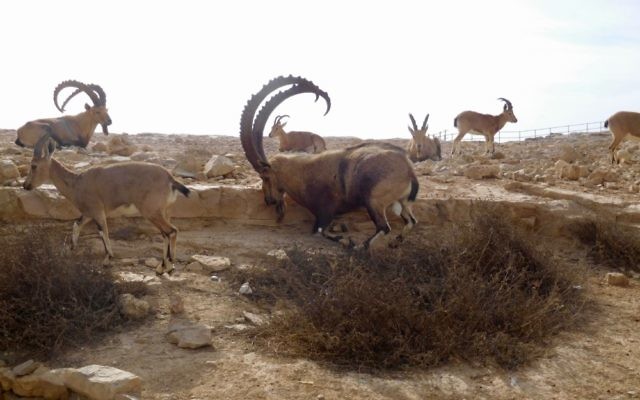Arava Brings Stories of Coexistence to Athens
A life-changing experience for Tel Aviv native Rachel Szor at the Arava Institute for Environmental Studies in Israel’s Negev desert.
Spending four months at the Arava Institute for Environmental Studies in Israel’s Negev desert was life-changing for Tel Aviv native Rachel Szor.
She met people from different religions and cultures, made friends from Jordan and Palestinian territories, and learned about environmental problems facing the entire Middle East, not just Israel.
Palestinian Mahmood Al Ramahi’s decision to attend the Arava Institute didn’t sit well with his family. His grandfather was one of the estimated 700,000 Arabs who fled their homes in 1948 during Israel’s War of Independence.
Al Ramahi learned at the institute that Israelis aren’t just settlers living illegally in the West Bank or soldiers at checkpoints harassing people. He got to know Israelis as people and friends, something he had never imagined.
“Life is not as we live it,” he said.
The two twentysomethings shared their stories with students at the University of Georgia in the Warnell School of Forestry on Friday, Feb. 9. The appearance was sandwiched between talks at Emory University and the Presbyterian Columbia Theological Seminary.
UGA forestry professor Gary Grossman invited them to Athens, along with Ari Massefski, the university relations director for the Friends of the Arava Institute, a fundraising organization based outside Boston. The American nonprofit supports the institute by raising 80 percent of its operating budget, recruiting students and raising public awareness.
Grossman was in Israel last summer on a fellowship sponsored by Jewish National Fund and Media Watch International. Among other places, he visited Kibbutz Ketura, where the institute has its headquarters.
The trip gave him ideas for collaborating on research with fellow ichthyologists and teaching at different universities, including the Arava Institute, which has a partnership with Ben-Gurion University of the Negev in Be’er Sheva.
Located in the desert north of Eilat and almost three hours south of Jerusalem, the institute was founded in 1996 by people who believe “environmental issues transcend politics,” Massefski told the UGA audience.
A third of the students studying the ecology of the desert at Arava are Jewish, a third are Arabs from the West Bank or Jordan, and a third are from outside the region. People from 47 countries have spent at least three months at the institute.
Szor said her time in the Israeli army was the first time she was around different cultures and languages. She spent three months in a village trying to learn Arabic before going to Kibbutz Ketura and the institute. Her roommate was a Palestinian woman.
With the other students, “we built a community together,” Szor said. “To live together, it takes down walls, and you see the person.”
She said the students came together over the environment, focusing on such common issues as water and pollution, and learned that “nature knows no borders.”
Most memorable to Szor was the weekly peace-building seminar, a three-hour session during which people could discuss whatever they wanted, including the Palestinian-Israeli conflict. There was listening rather than shouting.
“We live in a world where we see only our story,” she said. “Because of Arava, the Middle East grew larger for me.”
Al Ramahi was raised in a small village in Jordan and earned an undergraduate degree in mechanical engineering. He came to the United States with an exchange program and worked at a McDonald’s in Hiawassee when he was 21.
Growing up, he knew about water scarcity: He watched his mother planning laundry day and scheduling showers with his three brothers, sister and parents.
When he was accepted at the institute, he was asked whether he would have a problem being with Israelis. He in turn asked institute officials whether they would have a problem with him as a Palestinian.
At the Arava Institute, “you learn to sit with each other and become comfortable enough to speak out,” Al Ramahi said.
He felt comfortable enough to do an independent study at the institute, working on waste management issues, then earned a master’s in hydrology from an Israeli university. He spent a summer at Brandeis before starting a doctoral program at the University of Szeged in Hungary, again concentrating on wastewater management.
He said he hasn’t talked about Arava with his friends, but his family has been more open to learning about his experience.
Szor is considering what to study in a university, as well as where to study. She’s living in Haifa, where she’s reading history, doing medical clowning and thinking about her Arava experience.
Her parents have been happy to hear about her time at the institute, though she said they weren’t in favor of her traveling to Jordan to see her new friends, some of the best she has had. She listened to her parents’ concerns. Then she went anyway.




comments